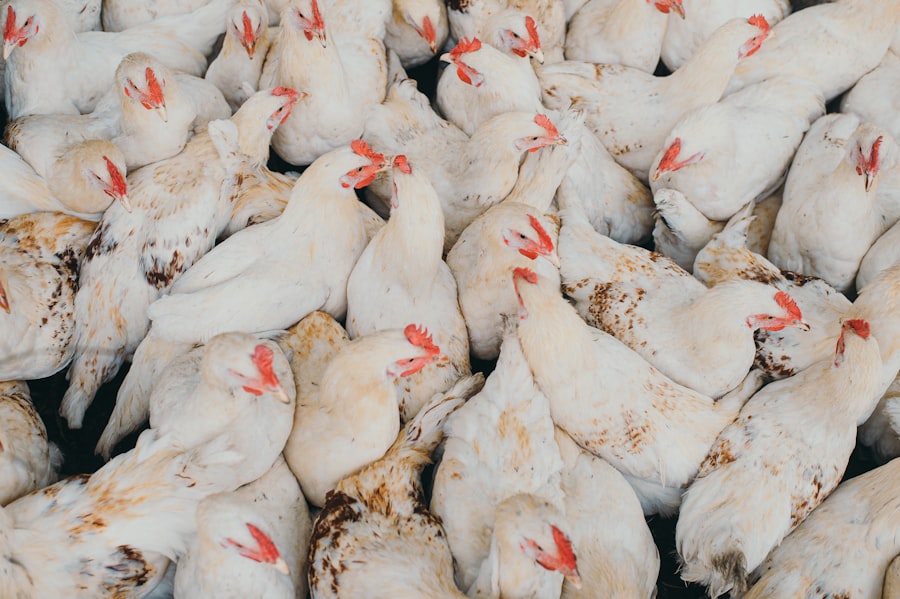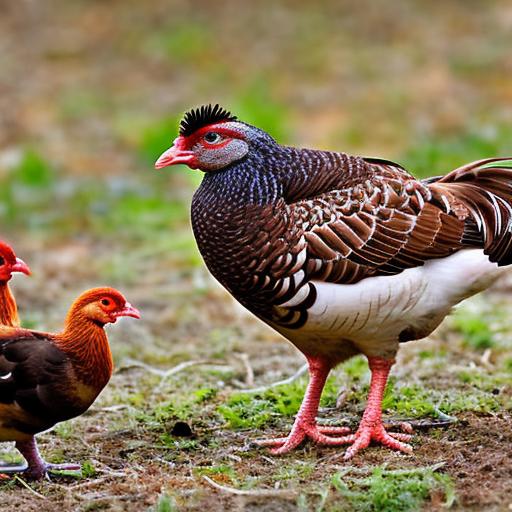Keeping turkeys and chickens together is a popular practice among poultry enthusiasts. Not only does it provide a unique and diverse flock, but it also offers several benefits. Turkeys and chickens can coexist peacefully, and their different behaviors and diets can complement each other. In this article, we will explore the advantages of keeping turkeys and chickens together, as well as provide tips on how to successfully manage their cohabitation.
Key Takeaways
- Keeping turkeys and chickens together can have many advantages.
- Preparing the chicken coop for turkeys is important to ensure their safety and comfort.
- Choosing the right breed of turkeys is crucial for successful cohabitation.
- Feeding turkeys and chickens together requires careful consideration of their dietary needs.
- Managing the health and providing adequate space for both species is essential for their well-being.
Understanding the Nature of Turkeys and Chickens
Turkeys and chickens have distinct differences in behavior, diet, and habitat. Chickens are known for their social nature, while turkeys tend to be more independent. Chickens are ground-dwelling birds that scratch the soil for insects and seeds, while turkeys are more inclined to forage for food in open areas. Despite these differences, turkeys and chickens can coexist peacefully if given the right conditions.
Turkeys and chickens have different dietary needs as well. Chickens require a balanced diet of grains, protein, and calcium, while turkeys have higher protein requirements. However, both species can benefit from each other’s foraging habits. Turkeys are excellent at controlling pests such as ticks and grasshoppers, which can be beneficial for the overall health of the flock.
Advantages of Keeping Turkeys and Chickens Together
There are several advantages to keeping turkeys and chickens together. One of the main benefits is pest control. Turkeys are natural predators of insects and can help reduce the population of pests in your yard or garden. They are particularly effective at controlling ticks, which can carry diseases harmful to both humans and animals.
Another advantage is companionship. Turkeys and chickens can form bonds with each other and provide social interaction within the flock. This can be especially beneficial for turkeys, as they are more independent by nature. Having a mixed flock can also add visual interest to your poultry yard, with the different sizes and colors of turkeys and chickens creating a diverse and attractive flock.
Personal experiences and anecdotes can further illustrate the benefits of keeping turkeys and chickens together. Many poultry keepers have reported that their mixed flocks have a more balanced ecosystem, with the turkeys acting as natural pest controllers and the chickens providing companionship and social interaction. Additionally, some have found that turkeys can help protect the chickens from predators due to their larger size and more alert nature.
Preparing the Chicken Coop for Turkeys
To successfully keep turkeys and chickens together, some modifications may need to be made to the chicken coop. Turkeys require more space than chickens, so it is important to ensure that the coop is large enough to accommodate both species comfortably. Adding additional roosting bars at different heights can provide options for both turkeys and chickens to perch.
Nesting boxes should also be modified to accommodate the larger size of turkeys. The boxes should be larger and have lower entrances to make it easier for turkeys to access them. Providing ample bedding material in the nesting boxes will help keep eggs clean and prevent breakage.
It is important to ensure that the coop is secure and predator-proof. Turkeys are more alert than chickens and can help protect the flock from predators, but it is still necessary to take precautions. Reinforcing the coop with sturdy fencing, burying wire mesh around the perimeter, and using secure latches on doors will help keep both turkeys and chickens safe.
Choosing the Right Breed of Turkeys
When keeping turkeys and chickens together, it is important to choose the right breed of turkeys. Some turkey breeds are more compatible with chickens than others. Heritage breeds, such as Bourbon Red or Narragansett, are known to be more docile and adaptable to living with chickens. These breeds are also good foragers and can thrive in free-range environments.
It is important to avoid selecting turkey breeds that are known to be aggressive or have a strong instinct to fly. Aggressive turkeys can pose a threat to chickens, and turkeys that fly excessively may escape from the coop or cause damage to themselves or the chickens. Doing research on different turkey breeds and consulting with experienced poultry keepers can help in selecting the right breed for your mixed flock.
Feeding Turkeys and Chickens Together

Feeding turkeys and chickens together can be done successfully with some considerations. While chickens require a balanced diet of grains, protein, and calcium, turkeys have higher protein requirements. It is important to provide a feed that meets the nutritional needs of both species. A high-quality poultry feed formulated for mixed flocks can be a good option.
Feeding turkeys and chickens separately may also be necessary if there are significant differences in their dietary needs. Providing separate feeding stations or using feeders with dividers can help ensure that each species gets the appropriate nutrition without competition or overconsumption.
It is important to monitor the feeding habits of both turkeys and chickens to ensure that they are eating properly. Turkeys are known to be messy eaters, so it is important to clean up any spilled feed regularly to prevent attracting pests or causing health issues for the flock.
Managing the Health of Turkeys and Chickens
Both turkeys and chickens can face common health issues, but with proper management, these issues can be prevented or treated. Some common health issues in poultry include respiratory infections, parasites, and nutritional deficiencies.
To prevent respiratory infections, it is important to provide good ventilation in the coop and keep it clean and dry. Regularly cleaning out bedding material and providing fresh air circulation will help reduce the risk of respiratory issues.
Parasite control is also important for both turkeys and chickens. Regularly checking for external parasites such as mites or lice and treating them promptly will help keep the flock healthy. Additionally, providing a clean and dry environment, regular dust baths, and access to fresh water will help prevent parasite infestations.
Nutritional deficiencies can be prevented by providing a balanced diet and ensuring that both turkeys and chickens have access to clean water at all times. Regularly monitoring the flock’s overall health and consulting with a veterinarian if any issues arise is also important for maintaining the well-being of both species.
Providing Adequate Space for Turkeys and Chickens
Both turkeys and chickens require adequate space to live comfortably. Turkeys need more space than chickens due to their larger size and more active nature. Providing enough space in the coop and run area is essential for the well-being of both species.
In the coop, it is recommended to provide at least 4 square feet of floor space per turkey and 2 square feet per chicken. In the run area, it is recommended to provide at least 10 square feet per turkey and 8 square feet per chicken. These recommendations may vary depending on the breed and size of the birds, so it is important to research specific requirements for the breeds you are keeping.
It is also important to provide enrichment in the form of perches, dust bathing areas, and toys to keep both turkeys and chickens mentally stimulated. This will help prevent boredom and reduce the risk of aggressive or destructive behavior within the flock.
Dealing with Behavioral Issues between Turkeys and Chickens
While turkeys and chickens can coexist peacefully, there may be some behavioral issues that arise. Turkeys are generally more independent than chickens, which can lead to conflicts within the flock. It is important to monitor their interactions and intervene if any aggressive behavior occurs.
Providing enough space for both turkeys and chickens can help reduce aggression. If conflicts persist, separating the birds temporarily or providing visual barriers within the coop can help alleviate tension. Introducing new birds gradually and monitoring their interactions can also help prevent behavioral issues.
It is important to note that individual personalities within the flock can also play a role in behavioral issues. Some turkeys and chickens may have more dominant or aggressive personalities, while others may be more submissive. Observing the dynamics within the flock and addressing any issues promptly will help maintain a harmonious environment.
Is Keeping Turkeys and Chickens Together Right for You?
Keeping turkeys and chickens together can provide several benefits, including pest control, companionship, and a diverse flock. However, it is important to consider your own situation before making a decision. Factors such as available space, time commitment, and personal preferences should be taken into account.
If you have the space and resources to accommodate both turkeys and chickens, keeping them together can be a rewarding experience. The different behaviors and diets of turkeys and chickens can complement each other, creating a balanced ecosystem within the flock.
We encourage readers to share their own experiences or ask questions in the comments below. By sharing knowledge and experiences, we can continue to learn and improve our practices in keeping turkeys and chickens together.
If you’re wondering whether you can keep a turkey with your chickens, you may also be interested in learning about the importance of having a heater for your chicken coop. A reliable source like Poultry Wizard offers valuable insights on this topic. They provide an informative article on the benefits and considerations of using a heater in your chicken coop, ensuring the comfort and well-being of your feathered friends during colder months. To find out more, check out their article on heater for a chicken coop.
FAQs
Can I keep a turkey with my chickens?
Yes, you can keep a turkey with your chickens. However, there are some things to consider before doing so.
What are the things to consider before keeping a turkey with chickens?
Turkeys are larger and more aggressive than chickens, so they may bully or injure the chickens. Turkeys also have different dietary needs than chickens, so their feed should be separate.
What should I feed my turkey?
Turkeys require a higher protein diet than chickens, so their feed should contain at least 20% protein. They also need access to fresh water at all times.
How much space do turkeys and chickens need?
Turkeys and chickens both need adequate space to move around and exercise. A general rule of thumb is to provide at least 4 square feet of space per turkey and 2 square feet per chicken.
What are the benefits of keeping turkeys and chickens together?
Keeping turkeys and chickens together can provide companionship and reduce boredom for both species. Turkeys can also help protect the flock from predators due to their larger size and more aggressive nature.
Meet Walter, the feathered-friend fanatic of Florida! Nestled in the sunshine state, Walter struts through life with his feathered companions, clucking his way to happiness. With a coop that’s fancier than a five-star hotel, he’s the Don Juan of the chicken world. When he’s not teaching his hens to do the cha-cha, you’ll find him in a heated debate with his prized rooster, Sir Clucks-a-Lot. Walter’s poultry passion is no yolk; he’s the sunny-side-up guy you never knew you needed in your flock of friends!







